Online colleges in Minnesota can allow you to attend a school in the state from anywhere in the world.

Online colleges offer you the opportunity to study at a school regardless of your location as long as you have a stable internet connection.
Editorial Listing ShortCode:
The northern state offers top-notch colleges and universities and generous grant and scholarship programs and is ahead of the nation when it comes to online learning opportunities.
Online Colleges in Minnesota

The National Center for Education Statistics (NCES) states that approximately 39% of college students in Minnesota are enrolled exclusively in online courses, which is more than the national average.
On top of that, about another 24% are participating in a hybrid of online and on-campus courses. Some of the state’s top online colleges offer multiple certificates, as well as undergraduate, graduate, and doctorate degrees online.
Some programs, such as psychology, information technology management, accounting, and marketing, are available in a fully online format. Others may be offered through partially online formats, where 50-80% of the instruction is online.
Likewise, many online universities in MN offer bachelor’s degree completion programs, undergraduate certificates, and graduate programs through fully online formats.
Editorial Listing ShortCode:
Many private schools also offer online learning opportunities. In fact, Minnesota is home to some of the largest regionally accredited online colleges in the country.
A number of tools exist to help support online learners in the state. Distance Minnesota is a partnership between four schools, providing online coaching, faculty development, and support for students.
The Minnesota Office of Higher Education is an agency that helps students locate credible online programs and understand and procure financial aid, among other things.
Common Online Degrees in Minnesota

Online universities in Minnesota offer a variety of associate, bachelor’s, master’s, and doctoral degree programs for students pursuing higher education. These are some of the most popular degrees in Minnesota and what they typically entail:
- Accounting: During an accounting degree program, you can learn how to compile and analyze financial information. Graduates of this program often go on to become accountants, auditors, and financial consultants.
- Business Administration: Earning a business administration degree can give you the opportunity to learn how to oversee business operations. After graduating, you may become a manager or executive in different types of organizations.
- Criminal Justice: Criminal justice is an interdisciplinary program that focuses on areas like law, psychology, and public administration. It often serves as a strong foundation for future law enforcement officers, investigators, corrections officers, and intelligence analysts.
- Marketing: In a marketing degree program, you can study how to attract the interest of potential customers and increase sales. Many marketing graduates work in advertising, public relations, and marketing positions.
- Healthcare Administration: Healthcare administrators are responsible for managing healthcare facilities, like hospitals, clinics, and private practices. During a healthcare administration degree program, you can study subjects like human resources, budgeting, and regulatory compliance.
Programs and specific studies will vary from school to school, and these are just some of the most popular programs of study you may find. When choosing a degree, it is important to consider your career goals and how a particular program might help you reach them.
Overview of Higher Education in Minnesota

In Minnesota, there are 82 degree-granting institutions, according to the NCES. Of those, 43 are public, 33 are non-profit, and 6 are for-profit.
To earn online degrees in MN at one of the state’s 4-year public institutions, NCES reports that the cost of tuition and fees is, on average, $11,863 a year for in-state students. Out-of-state students pay on average $24,620, which is below the national average.
Fellow Midwesterners may get a bit of a discount, thanks to Minnesota’s partnership with the Midwest Student Exchange Program (MSEP).
Editorial Listing ShortCode:
MSEP offers a tuition reciprocity program that allows students to enroll at public colleges and universities in participating states while paying no more than 150% of the in-state tuition rate.
Employment Outlook for College Graduates in Minnesota

Minnesota offers a promising employment outlook and competitive salaries for college graduates. Data from the Bureau of Labor Statistics shows that the state’s workforce includes more than 2.8 million people.
Some of the strongest industries in the state include office support, sales, and transportation. Growing areas of employment for college graduates include business and financial operations, healthcare, management, and education.
According to the Bureau of Labor Statistics, the unemployment rate in Minnesota generally ranges between 2.7% and 3.0%, which is lower than the national rate of 3.7% for the same period.
The median annual salary for employees in all occupations in Minnesota is $48,760. This is higher than the national median wage for all occupations, which is $46,300.
Careers & Salaries in Minnesota
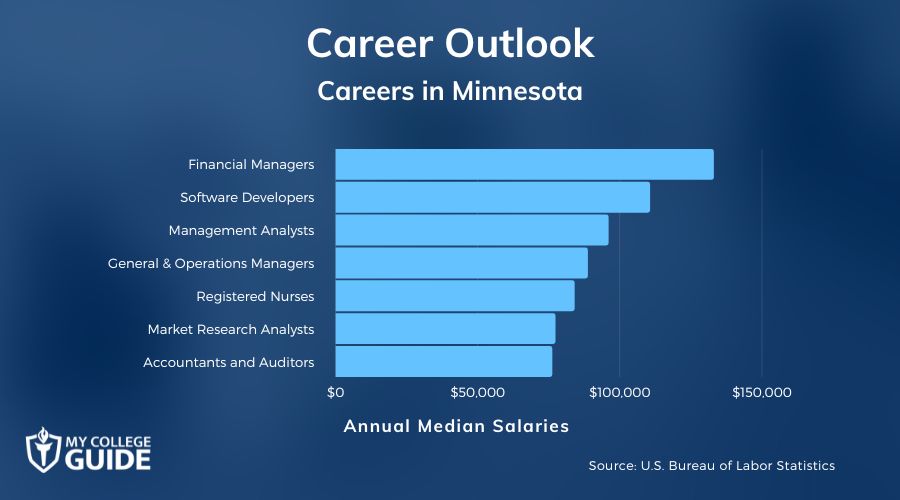
There are many rewarding professions in Minnesota with competitive salaries. Among the fastest-growing industries are office and administrative support, sales, and transportation.
While these areas of employment may not always require a degree, pursuing higher education may help you become better qualified for administrative or management roles and to negotiate for a higher salary.
Prominent fields in the state that often require college degrees include business, healthcare, and education. Many of these roles offer above-average salaries compared to the national median salary for all occupations.
For instance, data from the Bureau of Labor Statistics shows that the median annual salary for business and financial operations occupations in Minnesota is $76,865. Healthcare practitioners have median earnings of $77,750 per year.
According to the Bureau of Labor Statistics, these are common careers for college graduates in Minnesota.
| Careers | Annual Median Salaries |
| Financial Managers | $133,040 |
| Software Developers | $110,600 |
| Management Analysts | $96,000 |
| General and Operations Managers | $88,710 |
| Registered Nurses | $84,050 |
| Market Research Analysts and Marketing Specialists | $77,310 |
| Accountants and Auditors | $76,190 |
| Human Resources Specialists | $70,320 |
| Business Operations Specialists | $65,060 |
| Medical Secretaries and Administrative Assistants | $46,200 |
These are just some of the careers you may pursue. Specific career availability and salaries depend on a variety of factors, including location, education, and experience.
How to Know If an Online Degree Is Right for Me

Completing an online degree is an excellent option for many students. To decide whether it’s the right choice for you, it may help to consider these key points:
- Technology requirements: To complete your online coursework, you’ll need reliable internet access and devices that meet minimum technology requirements.
- Self-discipline: Online classes often require excellent time management and study skills because you won’t see your teachers for regular class sessions.
- Social interactions: In online courses you may interact with your classmates and instructors via email, chats, and livestream sessions, which may not be the best fit if you prefer face-to-face interactions.
- Flexibility: An online degree may be ideal if you need more flexibility in your schedule to balance your education with your work and family obligations.
It’s also important to remember that online degree programs differ significantly in terms of timeframe, format, and cost.
Online Minnesota Universities Admissions Requirements

Online colleges in MN have admissions criteria that you’ll need to meet prior to enrolling. Although every program is different, some of the most common requirements include:
- SAT or ACT scores (not required at all schools)
- Letters of recommendation
- Personal essay
- High school transcripts (and college transcripts, if applicable)
In addition to these materials, you’ll likely need to submit an official application and may need to pay an application fee.
MN Online Colleges Accreditation
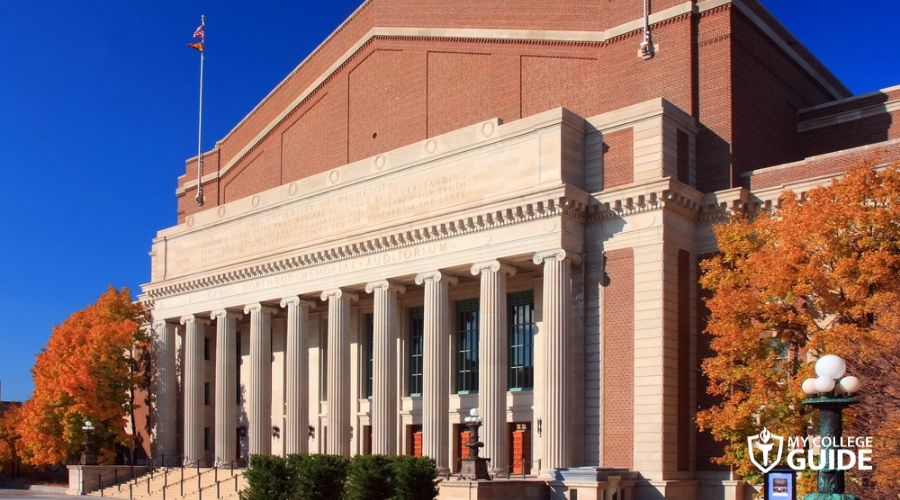
Accreditation status is an important thing to consider when researching an online degree in MN. Colleges and universities can apply for regional accreditation, at which point they must complete an extensive assessment process.
Editorial Listing ShortCode:
Regional accrediting bodies have the highest standards for academic programs. When a school achieves regional accreditation, it suggests that the program has qualified faculty and an up-to-date curriculum.
When you earn a degree from a regionally accredited institution, your qualifications may be more appealing to future employers. In addition, it’s usually easier to transfer credits from a school with regional accreditation status.
Financial Aid and Scholarships
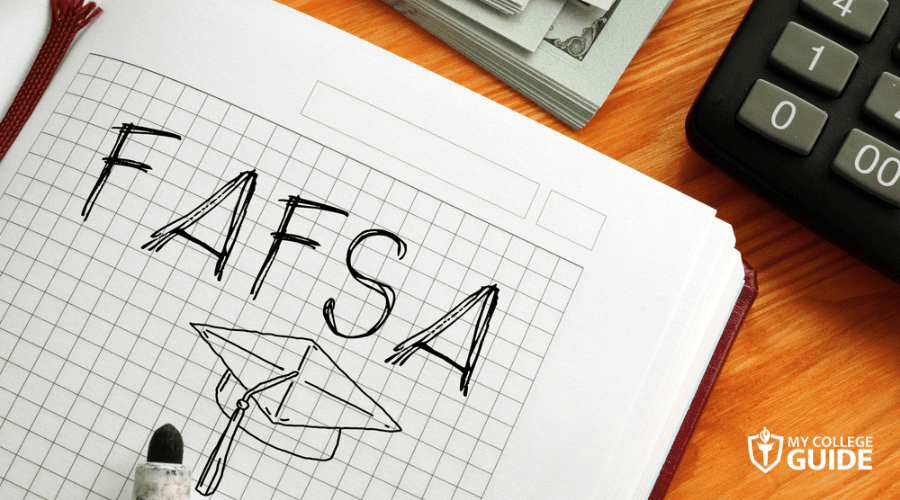
If you plan to attend an online college in Minnesota, the first thing you may want to do is complete the Free Application for Federal Student Aid (FAFSA). This is how you access federal, state, and some forms of private financial aid.
Since financial aid is usually awarded on a first come first served basis, it’s important that you apply as soon as possible. The FAFSA becomes available on October 1st of each year. Filling out the FAFSA application is typically quite simple.
Other types of financial aid include grants and scholarships, which do not have to be repaid as long as they are used appropriately.
The state of Minnesota offers a number of grants and scholarships to help residents afford higher education. Two of the most far-reaching state programs include:
- Minnesota Academic Excellence Scholarship: For students who have demonstrated outstanding ability, achievement, and potential in one of the following subjects: English, creative writing, fine arts, foreign language, math, science, or social science
- Minnesota State Grant Program: Need-based assistance for qualifying low- and moderate-income families
The state also administers the following aid programs for qualifying students with special circumstances:
- Minnesota Child Care Grant: Assistance with childcare costs for students who have children under the age of 12
- Public Safety Officer’s Survivor Grant: For the child or surviving spouse of a public service officer killed in the line of duty
- Alliss Opportunity Grant: For adults returning to college
- Minnesota Indian Scholarship: For students who are of ¼ or more American Indian ancestry and demonstrate financial need
- Minnesota Educational Assistance for War Orphans: For the child of a veteran who died because of a service-related condition
- Minnesota Veterans’ Dependents Assistance Program: For the child of a person considered to be a prisoner of war or person missing in action
- Education Vouchers for Former Youth in Care: For students who have been or are still in foster care
- Federal Grants for Aspiring Teachers: For students who intend to teach in an elementary or secondary school that services students from low-income families
Additionally, Minnesota offers a number of loan forgiveness programs to those in the healthcare field who agree to serve in specific areas for a certain period of time.
Editorial Listing ShortCode:
The programs listed above are funded by the state, but there are many more financial assistance opportunities available to Minnesotans. Here are just a few you may apply to:
- Linden Scholarship: $1,500 for 2 year college and $3,000 for 4 year college
- Minnesota Masonic Charities Scholarships: Varies
- Page Education Foundation Grant: $2,500
- Robert Yourzak Scholarship: Up to $2,000
You can also check with the colleges and universities you’re considering. Each one will offer its own financial assistance programs and can help you determine what you may qualify for and how to apply.
Minnesota Online Education Resources

Applying for and enrolling in college can be overwhelming. These online resources offer information that can help you with the process.
- Minnesota Office of Higher Education: This state website provides information about college options, financial aid, and scholarship programs.
- Minnesota House Research Department: The research department provides guidance on tax credits, student loans, and tuition reciprocity programs.
- MyHigherEd Minnesota: This site offers information for different types of students and the ability to search for accredited colleges in the state.
You can also consult with the admissions and financial aid specialists at your preferred schools for additional information.
How Much Does It Cost to Go to an Online College in MN?

The cost to attend an online college in Minnesota will depend on the type of school you attend, your residential status, and the specific program you take. In most cases, public universities are less expensive than private ones, and 2 year colleges usually have the lowest tuition rates.
In-state students generally pay much lower rates for tuition. For example, a Minnesota resident might pay around $11,000 a year in tuition compared to a non-resident who may pay more than $24,000.
Attending an online college in Minnesota is often more affordable than taking on-campus classes because you can save money on parking, housing, and transportation costs.
Tuition Breaks for Out-of-State Students

Out-of-state students who want to attend online colleges in Minnesota may be able to receive tuition discounts through certain programs.
Many colleges and universities in the state participate in reciprocity agreements with Wisconsin, North Dakota, South Dakota, and Manitoba. Under these agreements, qualifying students pay in-state rates when taking online classes in Minnesota.
Editorial Listing ShortCode:
Minnesota also participates in the Midwestern Higher Education Compact. This compact offers reduced out-of-state tuition for qualifying students from Illinois, Indiana, Kansas, Michigan, Missouri, Nebraska, North Dakota, Ohio, and Wisconsin.
In addition, some colleges and universities have eliminated out-of-state tuition for online students. At these schools, you’ll pay the same rate to attend online classes regardless of your residency. In some cases, you’ll have to pay distance education fees for online degree programs.
What Jobs Are in Demand in Minnesota?

When deciding on a degree program, it may be helpful to consider which careers are currently in high demand. According to the Minnesota Department of Employment and Economic Development, these are some of the most in-demand jobs in the state:
- Registered nurses
- Software developers
- General and operations managers
- Project management specialists
- Management analysts
Each of these positions generally requires an associate or bachelor’s degree. If you are interested in pursuing one of these career paths, you might study nursing, computer science, or business administration.
What Are the High Paying Jobs in Minnesota?
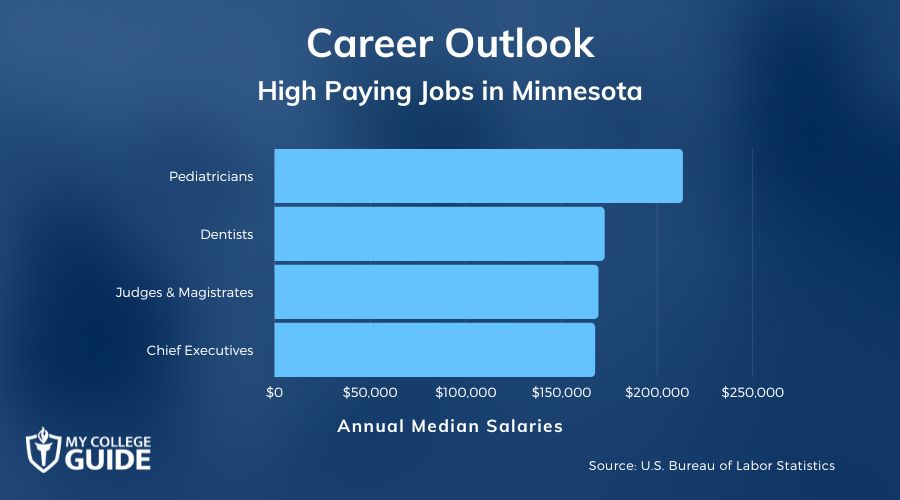
For many students, earning potential is another critical factor when choosing a degree program. According to the Bureau of Labor Statistics, some of the highest earners in the state are in healthcare. Pediatricians have a median annual salary of $213,410, while dentists have a median annual salary of $172,520.
Judges, magistrate judges, and magistrates are typically high earners as well with median annual salaries of $169,250.
Editorial Listing ShortCode:
Other typically high earners are chief executives, who earn median salaries of $167,540.
A particular position doesn’t guarantee a high salary. Your location, years of experience, and employer will also play a role in determining how much money you make.
List of Online Colleges in Minnesota
Methodology: The following school list is in alphabetical order. To be included, a college or university must be regionally accredited and offer degree programs online or in a hybrid format.

Augsburg University offers mostly online undergraduate degree programs for adults in fields such as psychology, accounting, marketing, nursing, finance, and management. Courses may include a limited number of face-to-face meetings.
Augsburg provides small class sizes and experiential learning opportunities, such as internships and study abroad.
Augsburg University is accredited by the Higher Learning Commission.

Bemidji State University has online bachelor’s degree completion programs in business administration, applied management, economics, accounting, and project management. These programs are designed for students who have already earned at least 24 college credits.
Hybrid on-campus and online options are also available.
Bemidji State University is accredited by the Higher Learning Commission.

Bethel University provides online, faith-based bachelor’s degree programs in fields such as business management, psychology, Christian ministries, social work, and accounting. The programs are designed to be convenient and provide a supportive learning community.
Some programs include on-campus intensives where students can meet with their classmates.
Bethel University is accredited by the Southern Association of Colleges and Schools Commission on Colleges.

Online bachelor’s degree options at Capella University include studies in information technology, psychology, nursing, business, and health sciences.
Capella’s online programs are available in two different formats, FlexPath and GuidedPath. FlexPath allows students to work at their own pace, while GuidedPath provides structure and deadlines. Both paths are designed to allow students to work while earning their degrees.
Capella University is accredited by the Higher Learning Commission.

Through its Global Campus, Concordia University—St. Paul offers 15 different online bachelor’s degree programs. Fields of study offered include business administration, digital marketing, health care management, accounting, and computer science.
Courses are taught from a Christian perspective and use an accelerated, 8 week format to help students earn their degrees faster.
Concordia University – St. Paul is accredited by the Higher Learning Commission.

Crown College aims to provide high-quality, Christ-centered online education. Classes are designed to teach both theoretical and practical knowledge to prepare students for the workforce. Fields of studies offered include business, biblical studies, criminal justice, and disaster and emergency management.
Crown College is accredited by the Higher Learning Commission.
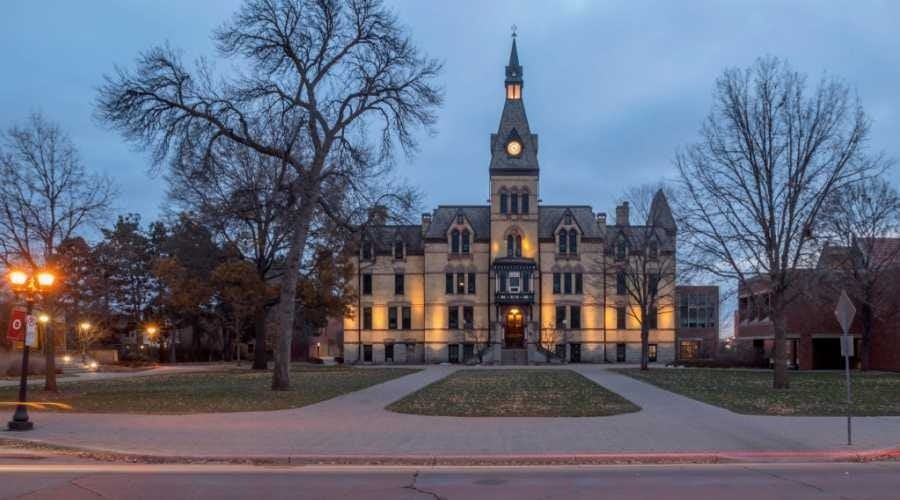
Hamline University has online bachelor’s degree completion programs designed for adults who already have some college credits. Fields of study offered include business administration, psychology, and education.
Online students never need to come to campus and can interact with classmates through discussion boards.
Hamline University is accredited by the Higher Learning Commission.

Martin Luther College offers online programs for adult learners in education and ministry. All courses are taught from a Lutheran perspective and designed to help students grow spiritually and learn new practical skills.
Online courses at MLC usually follow the same schedule as those on campus.
Martin Luther College is accredited by the Higher Learning Commission.

Metropolitan State University offers fully online bachelor’s degree programs in marketing, supply chain and operations management, health system studies, business administration, and more. Students may create their own paths through the school’s individualized studies program.
Online classes are taught by the same instructors who teach on campus.
Metropolitan State University is accredited by the Higher Learning Commission.

Through its Extended Campus, Minnesota State University—Mankato offers a variety of online degree completion programs designed to meet the needs of working adults. Areas of study offered include business administration, applied leadership, nursing, and dental hygiene.
MSU’s programs emphasize practical and hands-on skills that can be applied in the workplace.
Minnesota State University – Mankato is accredited by the Higher Learning Commission.

Saint Mary’s University of Minnesota offers online bachelor’s degree completion programs in business administration, HR management, IT, accounting, and applied psychology.
These programs are designed for working adults who already have some college credits. Students can study from anywhere with a reliable internet connection.
The Saint Mary’s University of Minnesota is accredited by the Higher Learning Commission.

Southwest Minnesota State University offers flexible online undergraduate degree programs in marketing, nursing, political science, community psychology, health promotion, and more.
Online courses at SMSU may be synchronous or asynchronous. Online students may be invited to activities on campus, but these are never required.
Southwest Minnesota State University is accredited by the North Central Association of Colleges and Schools and the Higher Learning Commission.

St. Cloud State University has fully online bachelor’s degree programs in professional communications, geography, land surveying and mapping sciences, and elective studies. The school also has degree completion programs in nursing and general business.
Courses may be synchronous or asynchronous. Online students have access to tech support, library services, and other resources.
St. Cloud State University is accredited by the Higher Learning Commission.

The College of St. Scholastica offers numerous fully online degree programs. Areas of study offered include organizational leadership, elementary education, business management, computer information systems, and accounting.
Classes are small and designed to facilitate interaction. Online students have access to all the same resources as those on campus.
The College of St. Scholastica is accredited by the Higher Learning Commission.

Online majors offered at the University of Minnesota—Crookston include accounting, IT management, criminal justice, communication, agricultural business, and health management.
UMN Crookston has been offering online programs for over 20 years. The courses are designed to allow students to learn at their own pace.
The University of Minnesota – Crookston is accredited by the Higher Learning Commission.

The University of Minnesota—Twin Cities offers online and hybrid degree programs in construction management, health services management, business administration, and more. Numerous certificate programs are also available online.
U of M Twin Cities puts an emphasis on experiential learning by offering internship and research opportunities.
The University of Minnesota – Twin Cities is accredited by the Higher Learning Commission.

All adult undergraduate programs at the University of Northwestern—St. Paul have some online components. The school offers fully online programs in business management, ministry, psychology, and general studies.
All classes are taught from a Christian perspective and designed to provide a supportive learning community. Online students have access to tutoring and other resources.
The University of Northwestern – St. Paul is accredited by the Higher Learning Commission.
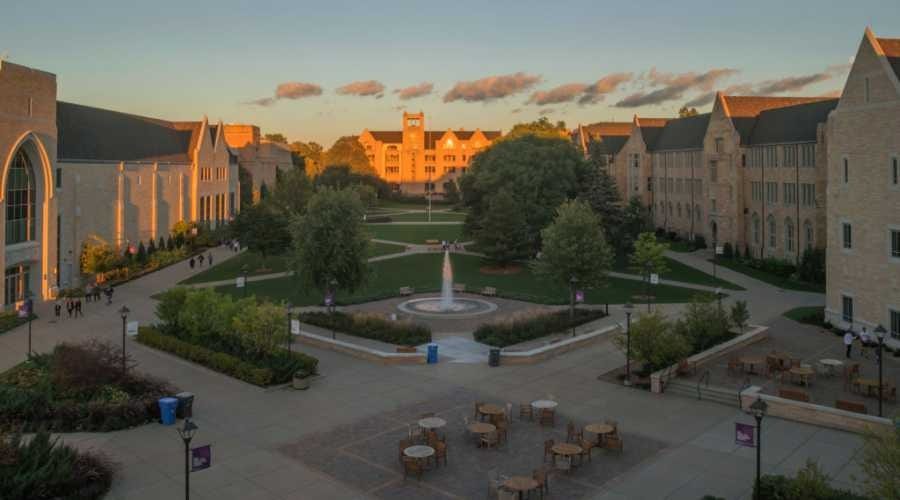
The University of St. Thomas offers online degree programs in business analytics, business administration, social work, and more.
Many individual courses are also available online, and students are welcome to take a combination of online and on-campus courses as is convenient for them. The University of St. Thomas teaches from a Catholic perspective.
The University of St. Thomas is accredited by the Higher Learning Commission.

Walden University offers more than a hundred online degree and certificate programs. Fields of study offered include information technology, social work and human services, health and health sciences, and public policy and administration.
All of Walden’s programs are designed for working professionals with full schedules.
Walden University is accredited by the Higher Learning Commission.
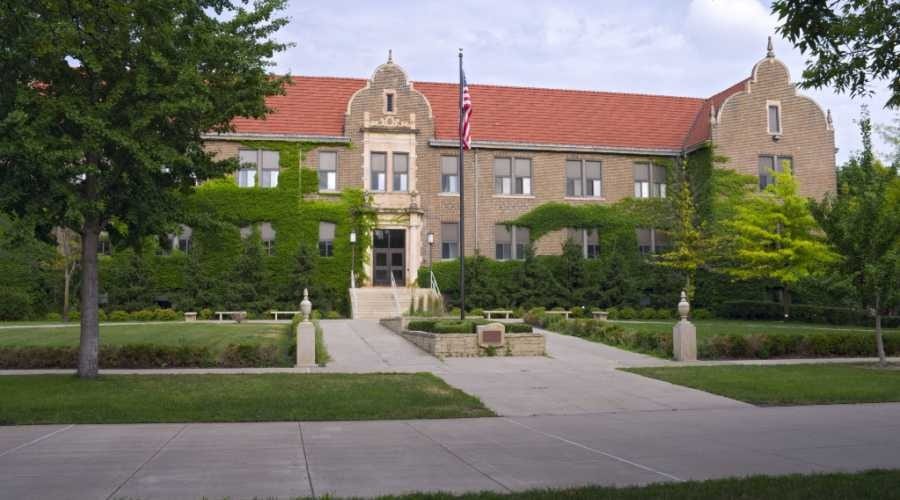
Winona State University offers online bachelor’s degree completion programs designed for adults who already have some college credits. Fields of study offered include healthcare leadership, HR management, education, business administration, nursing, and health and wellness management.
Winona State’s online classes may include virtual meetings at set times.
Winona State University is accredited by the Higher Learning Commission.
Getting Your Online Degree in Minnesota

Minnesota has a number of excellent institutions, many of which offer fully or partially online degree programs, and students can pursue dozens of grants and scholarships to help ease the financial burden.
To get started with one of the many Minnesota online degrees, you can begin by researching accredited schools in the state that offer your chosen degree program.
You can also view our Online Colleges in Michigan and Online Colleges in Mississippi guides for more options.
